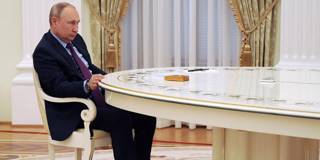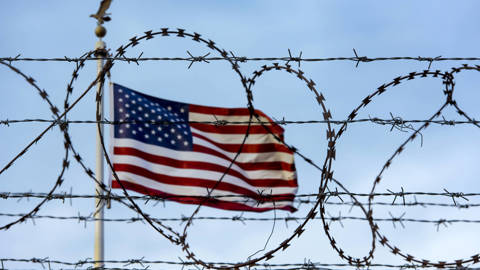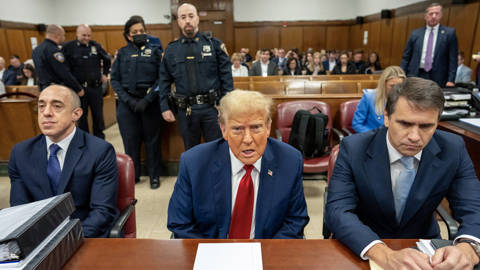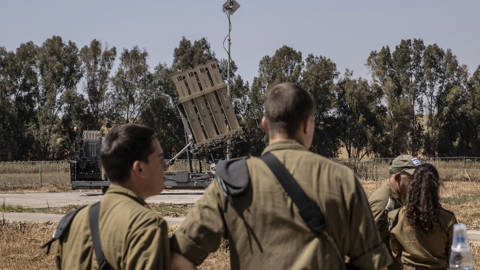Putin’s Historic Blunder
By abandoning all reason and transforming his country into an international pariah overnight, Vladimir Putin has confirmed that modern Russia is built on lies, blind obedience, and violence. The great irony is that he has even managed to fool himself.
After interviewing Adam Michnik just before Russia’s invasion of Ukraine on February 24, 2022, Irena Grudzińska Gross of the Polish Academy of Sciences followed up with the Polish historian, editor, and former dissident on May 19. Together, they explored Michnik’s evolving opinion of Russian President Vladimir Putin, the historical and cultural roots of the Kremlin’s neo-imperial project, and the international response to the war.
Irena Grudzińska Gross: When we spoke in early February, three weeks before Putin launched his war of aggression in Ukraine, you argued very convincingly that the invasion would not happen ...
Adam Michnik: It turns out that life doesn’t adhere to even the most logical thinking.
IGG: Why did you think so?
AM: It was based on straightforward reasoning about the situation. As you know, I have met Putin several times, and he made a good impression on me at first. He was matter of fact, eschewing newspeak and Soviet clichés. He answered questions. He was no liberal, of course, but he seemed like a man who wanted to continue former Russian President Boris Yeltsin’s policy while also reforming it. It is worth remembering that it was Yeltsin who basically annihilated Bolshevism as the dominant force and political project in Russia.
Putin has now gone in a very different direction. In his speech foreshadowing the war, he questioned Lenin’s legacy and essentially rejected him in the name of Stalin. Lenin, in his opinion, was a destroyer of Russian power, whereas Stalin was its restorer.
IGG: How has your opinion of Putin changed over time?
AM: I had a good impression of him only at the beginning. In 2010, during a conference of the Valdai Discussion Club, I confronted him about Mikhail Khodorkovsky, the oligarch who had been arrested and imprisoned on dubious charges in 2003. Putin responded angrily. By then, my impression of him was that he was a bandit. But I saw him as a calculating gangster – not like Hitler, who went crazy, but in some ways like Stalin, who knew where to stop.
Stalin had an appetite like a shark, but he knew what not to swallow. He withdrew from Finland when he could not conquer it. He made an agreement with Berlin (the Wall was not built until Nikita Khrushchev’s time). He did not snap up all of Austria, but rather agreed to zones of influence. When Putin started bombing Kyiv, that convinced me that he was no longer a calculating gangster, only a psychopath.
IGG: The bombing of Kyiv surprised you?
AM: It showed that Putin had lost it completely. First, he was deluded into thinking that he would take Ukraine in three days, just as he did Crimea in 2014. He was deeply convinced that he would be greeted with enthusiasm by a massive “fifth column” of Russia-loving Ukrainians. Like many Russians, he deeply believes that Kyiv is part of Russia.
Second, Putin completely underestimated whom he is dealing with. Since 2014, the Ukrainian army has undergone a huge modernization. They fight wonderfully and are motivated, while Russia’s soldiers do not know what they are doing there.
And, third, Putin did not anticipate that the West would react as it did. He expected a repeat of the non-response after Crimea: verbal declarations and wrist-slap sanctions. What happened instead must have shocked him.
The Imperial Itch
IGG: It sounds like he was mistaken, but still calculating.
AM: Putin is rumored to have had a conversation some time ago with former Polish Prime Minister and European Council President Donald Tusk, where he jokingly said, “We are taking Kyiv, Donbas, Kharkiv, Odessa, and you take what once belonged to you: Lwów, Drohobycz, Stanisławów.” Those are former Polish cities that are now in Ukraine (Lviv, Drohobych, Ivano-Frankivsk). In retrospect, he wasn’t joking.
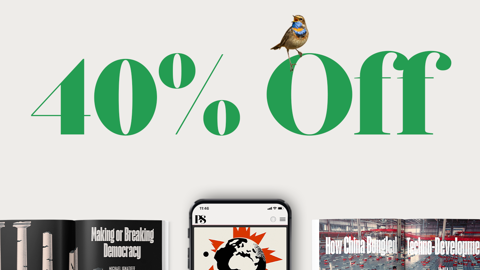
SPRING SALE: Save 40% on all new Digital or Digital Plus subscriptions
Subscribe now to gain greater access to Project Syndicate – including every commentary and our entire On Point suite of subscriber-exclusive content – starting at just $49.99.
Putin’s mistake was to base his calculations on the faulty information that his military and intelligence services were reporting to him. But the bombing of Kyiv was not based on calculation. That was a symbolic gesture to the rest of the world. It is one thing to claim that Crimea is not Ukraine or that Russian-speaking Donbas belongs to Russia. It is quite another thing to bomb Kyiv, the capital of an independent state that Russia itself recognized in the Budapest Memorandum almost three decades ago. Russia agreed to respect the inviolability of Ukraine’s borders in exchange for Ukraine’s renunciation of nuclear weapons.
This is where Putin truly went overboard. He bombed the city that is supposedly the cradle of Russia ...
IGG: Indeed, maybe he had in mind the historical continuation of Greater Russia rather than any contemporary NATO issue.
AM: Since these are thoroughly archaic ideas, the situation inevitably will end badly for Putin’s Russia in today’s world. To borrow from Gogol, from the nineteenth century on, people have wondered where the Russian troika (three-horse chariot) is heading. After World War I, Jan Kucharzewski claimed that Bolshevism was a new form of czarism. Others believed that it was the product of Western socialist, radical, Marxist left-wing thought. Aleksandr Solzhenitsyn described it as part of the legacy of French revolutionaries like Jean-Paul Marat or Robespierre. I think there is a bit of everything here.
Putin is after power, and he thinks of it in a truly archaic way: the more territory he has, the more powerful he is. This kind of thinking belongs to the nineteenth century. Nobody else thinks that way today. You don’t build power by seizing new territory. Hitler tried that and ultimately broke his neck on it. Stalin did it in a smarter way, placing the Soviet republics of Ukraine and Belarus in the United Nations.
IGG: But isn’t the essence of the empire related to territory?
AM: Undoubtedly, and the imperial tradition is extremely important to the Russian elite. One element of this tradition is the belief that Belarus and Ukraine are part of Russia. This is very entrenched among the elite, and not only within Putin’s inner circle. I have also heard it from democratically minded people. A painful and dangerous example is the twentieth-century Russian-American poet Joseph Brodsky in his famous poem lamenting Ukrainian independence. Though he never published it, he did compose it and does seem to have thought this way.
IGG: He must have, considering that he wrote it so emphatically.
AM: But a rather specific logic prevailed in Brodsky. He felt like a Jew in the Roman Empire – one of many minorities. I am convinced that he would not have supported this war if he was still alive. Nor even would Solzhenitsyn. He and Brodsky had a profound sense of the nature of imperial villainy.
Culture War
IGG: Do you think the belief that Ukraine is part of Russia is common in Russian culture?
AM: Yes, culturally, the idea that Ukraine is Russia, or that Ukrainians are Russia’s “little brothers,” is very widespread. In fact, I also once heard Khodorkovsky express this view, though he changed his mind after the invasion. I have encountered it at conferences, read it in the Russian press, and heard it from liberal Russians. When you read Mikhail Bulgakov, whose novel The White Guard is set in Kyiv, it is obvious that, as a Russian, he felt at home in the Ukrainian capital. Similarly, for the Russian journalist Viktor Nekrasov – a great man who was friends with many Ukrainian dissidents – Kyiv was his city.
That said, there are Russian elites who do not think this way, including the writers Viktor Schenderovich and Viktor Yerofeyev. Their views have become radicalized. The invasion came as a shock to them.
IGG: The invasion showed where such thinking leads.
AM: Exactly. And that is the biggest problem. It is difficult for me to imagine Russia saying that Kyiv is not a Russian city. And the same goes for Sevastopol, a mythical city with a heroic status in Russia.
But, at the same time, as US President Joe Biden noted in his March 2022 speech in Warsaw, some 200,000 people have already left Russia as a result of the war. That is a large number. The Russian elites have not disappointed me. In Gazeta Wyborcza, we constantly publish the views of Russians who do not agree with this war.
IGG: What about all the Russians who view Ukraine’s independence as a kind of disloyalty? Does this view translate into support for the war?
AM: In my opinion, no, the vast majority of Russians do not want war. Though I don’t know that for sure, I do not believe any of the recent polls claiming that Russians support Putin’s policy. After all, fear rules in Russia. You can be sentenced simply for using the word “war” instead of “military operation.” It’s madness.
In every society, there are people who prefer authoritarianism, nationalist populism, intolerance, and racism. The United States is a country founded on slavery and lynching. Russia is not necessarily doomed always to be a totalitarian dictatorship. France had its Jacobin terror, Germany had Nazism, England had Cromwell (who beheaded the king), and the Americans had Jim Crow. I believe that Russia’s course also will change. You cannot simply look back to the time of Ivan the Terrible and claim that it was obvious all along that Putin would invade Ukraine.
Putin’s war has generated extremely Russo-phobic attitudes. If we can no longer stage Chekhov, print Dostoevsky, or play Tchaikovsky, that is terrifying. It would represent a triumph of a totalitarian, intolerant, and stupid mentality. But that is what Putin has wrought. It is Russia’s curse.
IGG: Aren’t the recent cultural boycotts meant as a gesture of solidarity with Ukrainian culture, which is being destroyed?
AM: But it is Putin, not Tchaikovsky, who is destroying it. I am reminded of when French President Jacques Chirac made gestures toward Russia by announcing that he was reading Pushkin in Russian. I argued that he should not confuse Pushkin’s Russia with Putin’s Russia, and now I am saying it the other way around: We must not confuse Putin’s Russia with Pushkin’s Russia. One should not respond to meanness and stupidity with meanness and stupidity.
I know that I am in the minority on this issue in my country; but I am against the philosophy of boycotting everything that comes from Russian culture. The outstanding Ukrainian film director Sergei Loznitsa was excluded from the Ukrainian filmmakers’ union because he opposed the boycott of Russian films, like those by Andrei Tarkovsky. Fortunately, this exclusion was criticized by none other than Ukrainian President Volodymyr Zelensky, who came to Loznitsa’s defense.
IGG: You were very critical of Zelensky when we spoke in February.
AM: I was completely wrong. I must say this loud and clear: Zelensky passes the leadership exam with highest honors. He is an impressive man in every sense – heart and mind. It is a miracle that Ukraine has such a leader today. I was not alone in being wrong. A large share of the Ukrainian intellectual elite was also wrong about Zelensky. Of course, I have to beat my own breast, not someone else’s.
And I must add that Putin’s claim to be de-Nazifying Ukraine is completely despicable. Zelensky is not the Nazi; Putin is the one trying to eradicate an entire nation.
Poland’s Good Side
IGG: In the American press, many commentators describe today’s Russia as a fascist state whose propaganda accuses Ukraine of doing what it is doing itself.
AM: There are some issues here with labels and language. If we talk strictly about the structure of the Russian state, it is closer to fascism than to Nazism – closer to Mussolini than to Hitler. But this is a matter of nuance. Either way, it is terrifying to see what is happening – the murders, the rapes, the looting. I am terrified by what Putin’s marauding soldiery have already become.
On the other hand, I admire the Ukrainians for their courage and determination. I also admire the response from Polish society, which was not at all pro-Ukrainian before this. Something extremely important has happened here. More than three million Ukrainians have crossed the Polish borders, and many of them will remain, yet there have been no conflicts.
IGG: How do you explain this change?
AM: It helps that there is no significant force in Poland today that would hound Ukrainians. Neither the government nor the opposition does it, nor the intellectual, cultural, or religious elite. Recall the events of 1968. Until June 1967, the topic of anti-Semitism did not exist in my life. Yet it took only a few months of hounding, repression, incitement, and intimidation for it to explode.
This hell was unleashed by the first secretary of the communist party, Władysław Gomułka, who gave a speech on June 19, 1967, claiming that Poland had a Jewish fifth column. Four months of propaganda might have been sufficient to dredge up such sentiments again today, this time directed against Ukrainians. But nothing like that has happened. We have seen Poland’s good side.
IGG: Though we failed with our previous prophecies, I still have to ask: How do you think the war will end?
AM: I think Putin has already lost. He showed that all of Russia is built on lies, on obedience, on violence. Everyone has now seen what it means to be ruled by a KGB lieutenant colonel and his entourage. These people are digging modern Russia’s grave, and I wish them success.
Never before has Russia’s image been so tarnished. Putin brought this on his country without provocation. In my opinion, this must end badly for him. It is clear that the Ukrainians will not give up, and that the West will not repeat the model of Munich in 1938 or Yalta in 1945. I predict that the West will not come to an agreement with Putin at the expense of Ukraine. For the sake of Ukraine and the West, I hope I am right this time.
